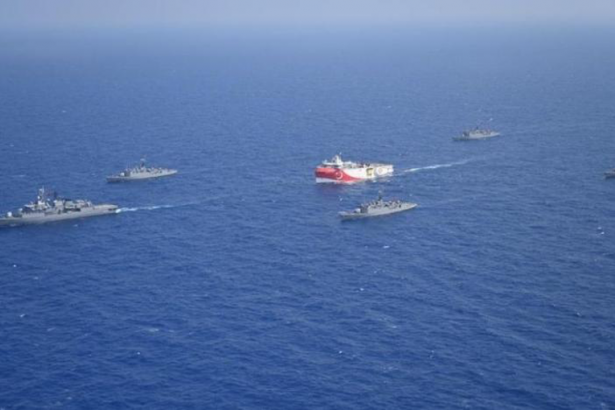Tensions between Greece and Turkey rise in Eastern Mediterranean over Turkish exploration drilling

After the Turkish government issued a NAVTEX, an announcement or warning of imminent maritime activity or exploration, and deployed a drilling ship, Oruç Reis, under the protection of a large navy in the Eastern Mediterranean between August 10 and August 23, Athens declared a counter-NAVTEX to Ankara’s decision announced earlier on Monday, urging the European Union an emergency meeting amid growing tensions with Turkey over drilling activities in the region.
Upon the rising political tension in the Eastern Mediterranean after the NAVTEX issued by the Turkish authorities, the Greek Prime Minister Kyriakos Mitsotakis and General Secretary of NATO, Jens Stoltenberg, held a phone call.
“The situation must be resolved in a spirit of Allied solidarity and in accordance with international law”, Stoltenberg underlined on his Twitter account after the phone call.
On August 10, Greece's Prime Minister Kyriakos Mitsotakis had convened the government's National Security Council following Ankara announced its exploration drilling vessel would be carrying out activities in the Eastern Mediterranean in an area between Cyprus and Greece, while the Foreign Ministry of Greece invited the Turkish government to stop illegal activities that disrupt peace and security in the region.
ÇAVUŞOĞLU: GREECE HAS NO LEGAL FOUNDATION
Issuing a counter statement against the Athens’ condemnation to Ankara’s drilling activities that violate Greece’s sovereignty; Turkish Foreign Ministry claimed that Greece has no legal foundation in its accusations, adding that the military existence in the region is for the right to self-defence for the Turkish civil ship MTA Oruç Reis.
Turkish Foreign Minister Mevlüt Çavuşoğlu also said that Turkey continues to support the rights of both Turkey and Turkish Cypriots in the Eastern Mediterranean.
‘‘Turkey will issue a license for the western part of its continental shelf in the Eastern Mediterranean and will continue its drilling activities,’’ Çavuşoğlu noted during a joint press conference with Azerbaijani Foreign Minister Jeyhun Bayramov.
“No one can claim that Turkey has not shown goodwill in the Eastern Mediterranean. Those who want to accuse a country in the region should condemn Greece” he added.
After Athens objected to Ankara’s seismic research activities in the south of the Greek island of Kastellorizo, German diplomatic efforts had helped ease the rising tensions between Turkey and Greece. Athens’ maritime delimitation agreement last week with Egypt as a counter move against a similar deal between Ankara and the U.N.-backed Libyan government in Tripoli has further sparked tensions between the two countries in the Eastern Mediterranean since Turkey claims the recent Greek-Egyptian deal violates its continental shelf and maritime rights.
BORREL CALLED BOTH SIDES TO ENGAGE IN DIPLOMACY
In response to the current escalation, Greek Foreign Minister Nikos Dendias asked on August 11 for an extraordinary EU Foreign Affairs Council (FAC) meeting after the talks with the U.S. Ambassador to Greece Geoffrey Pyatt, while Josep Borrell, the High Representative of the EU for Foreign Affairs and Security Policy, said the Latest naval mobilisations in Eastern Mediterranean are extremely ‘‘worrying’’ and they will not contribute to finding any solutions, calling on both sides to once again engage in diplomacy.
Since huge gas reserves have been explored in offshore areas of Cyprus in recent years, relations between Ankara and Athens have been tense for a long time over the ambitions on gas reserves and disagreements over sovereignty rights to strategic areas of the Eastern Mediterranean. Both countries have laid claim to overlapping zones, asserting they belong to their respective continental shelves.
In January 2020, the Cypriot government, Greece, Israel and Egypt agreed to work together to make the most of the gas resources in the region. As part of the agreement, energy supplies would be transferred to Europe via a 2,000 kilometers pipeline in the Mediterranean.
In November 2019, Ankara signed a deal with the U.N.-recognized Government of National Accord in Libya to create a so-called exclusive economic zone (EEZ) from the Turkish southern coast to Libya’s north-east coast, while Egypt and Greece condemned the agreement, declaring it as illegal.




